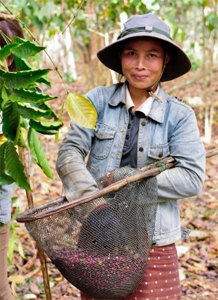Sustainable Development is the ability to use the current resources available to achieve maximum human satisfaction without any disruption to the normal living conditions for both the present and future generations. According to the 1987 definition of sustainable development by the United Nations World on Environment and Development it is seen as ‘’Development that meets the needs of the present without compromising the ability of future generations to meet their own needs.’’ This means that the developmental needs of the present generation when met adequately through the use of the resources at our disposal should not pose any unwanted problems for this and future generations to come so as to ensure that they also will have optimum satisfaction from the use of these resources.
Achieving such sustainable development in countries all over the world has been a very challenging task for most developmental organisations as various policies by governments and the activities of some individuals and groups sometimes seek to undermine the achievement of sustainable development. However, this has not deterred the advocacy for sustainable development in the world by the organisations seeking for sustainable development.
Achieving sustainable for the entire world has been done through ensuring that various areas of associated with sustainable development are tackled properly. Some of these areas include development and planning, economic recovery, environmental and natural capital and gender equality. These are further elaborated below;
Development and planning: This refers to the act of achieving sustainable development through laid down policies and measures that will in one way or the other ensure that resources needed for development are utilised in a way that will help in its ability to satisfy present developmental needs of the human race as well as the subsequent developmental needs of future generations. Development and planning can be seen as one of the main areas through which sustainable development can be achieved as every developmental deed will have to be carried out carefully and meticulously whilst keeping in mind the need to not upset the normal balance of the environment and all things within it. Ensuring the growth of the world in this way calls for carefully laid down policies that will have to be adhered to if the sustainable development goals are to be achieved. Gone were the days when man did what he had to do to survive without thinking about the effects of his various activities on the environment today and what it will mean for the environment tomorrow. Now every act of humans is guided by rules and regulations which seek to help sustain this world for today and the days ahead.
Economic recovery: In the bid to achieve sustainable development, one area that can never be overlooked is that of the economy in both the quantitative and qualitative aspects. Upon the realisation that various economic policies were rather militating against sustainable development, various economic recovery measures have been put in place to help check the economic nose-dive. These economic recovery measures have helped in turning the economy around from its downward growth. Some of these economic recovery areas include domestic products and the provision of goods and services that are of the highest quality. Economic recovery measures are all geared towards ensuring that the economy is given all the necessary things needed to help it recover from a very poor performance rating. Economic recovery is therefore realised when significant growth recordings in various economic indicators are recorded after the recession period. When the economy is helped to recover from such recessions, it aids in the bid to achieve sustainability in development.
Environmental and Natural Capital: These are the resources that are found within the natural environment which humans use to satisfy their numerous developmental needs. Environmental and natural capital are classified under two broad groups and these are the renewable resources found within the environment like food, water, forests and animals and the non renewable resources like coal, petroleum and other minerals found within the environment. Sustainable development sees to the making of policies like the Green Deal among others which ensures that these environmental and natural capital resources are effectively and efficiently utilised to ensure that both this and future generations will get their developmental needs met without jeopardizing the natural order of the environment.
Gender equality: According to the United Nations flagship study, sustainable development cannot be fully realised or achieved without first ensuring that gender equality exists whilst also ensuring that the women populace is adequately empowered so as to ensure that both genders are actively involved with the sustainable development of the world. This means that all hands will be on board in the bid to achieve sustainability of the environment presently and for generations to come without any compromising of the environment.

